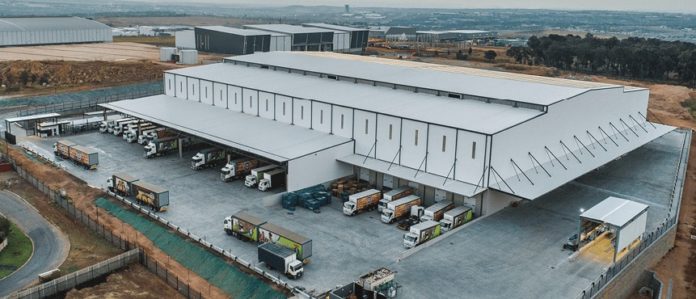The trend which saw logistics property growing as a sector because of the Amazons of the world needing more space to store their products will speed up in the post-Covid world as more people work and order from home.
The Economist focused in its 30 May 2020 issue on Prologis, Amazon’s biggest landlord. The American company has assets of $125-billion and 90 km² of floor space, and spent $25-billion in 2019 in America and Europe. E-commerce now accounts for about 40% of its construction activity, whereas it was a fifth before the pandemic.
A similar trend playing out in South Africa was noted by Nick Wilson in the Business Times (Sunday Times, 5 July 2020). The logistics property sector had “boomed in recent years due to the growth of e-commerce” but was likely to do even better because of Covid-19. About a third of Fortress’s R30-billion portfolio is in the logistics sector and it signed contracts in 2020 with Takealot and a Netflix production company.
The clients of Equites, a company which focusses on logistics property, include Amazon, Super Group, HDL and DSV, a Danish transport and logistics company. Equites is the only specialist logistics property company listed on the JSE. In six years, its portfolio has grown from R1-billion to R15-billion. There are more than 30 real estate investment trusts (REITs) on the JSE and they generally deliver good value.
FNB, which publishes a regular property barometer, has done an in-depth analysis of previous crises to help understand what may occur in the post-Covid property market. According to John Loos, a property strategist at FNB Commercial Property Finance, the most vulnerable sector is likely to be Retail Property. Smaller neighbourhood centres, with more essential items and greater convenience, will be less vulnerable.
This is borne out by the results announced by Resilient in 2020. Of the company’s 28 retail centres across South Africa, the ones that did best were the smaller, rural malls.

The South African Council of Shopping Centres calculates that the country has the sixth-highest number of shopping malls in the world. R2-billion was recently spent on Menlyn Park in Pretoria to expand it to 177 000 m² of gross lettable space while the Gateway Theatre of Shopping in Durban, South Africa’s second-biggest mall, recently spent R750-million.
The lockdown accelerated the trend for people to work from home, and so the Office Property sector will come under pressure. Many companies will be reducing office space but, as Loos writes, “Improved technology has gradually been driving a greater remote working trend for some years. Covid-19 has merely sped this trend up.”
Industrial Property will take a hit but is expected to recover strongly while Residential Property is expected to be the least at risk. Prices will likely go down, but people need a place to live and the work-from-home trend will increase the importance of residential property.
The lockdown accelerated the trend for people to work from home, and so the Office Property sector will come under pressure.
Loos concludes that, “In a few decades time, the composition of the property stock may look noticeably different to what it is today, the key features being a smaller portion of the total being retail and office property, and an even larger portion of the stock being residential property than is currently the case.”
Statistics SA has found that the percentage of South Africans living in flats has risen markedly. Whereas 26 out of 100 approved plans in 2013 were for flats, this figure reached 59 in 2016. Although the total number of people living in flats is still relatively small (5.4%), this figure will rise as urbanisation increases.
Construction rebuilding
Job losses and business rescues have been recurring themes in the South African construction sector for some time. The fact that some kind of recovery must happen after the lockdown will give hope to all construction and construction material companies, and they will hope that increased order books will allow them to restart some of their facilities.
Corobrick is a manufacturer of masonry, pavers and concrete earth retaining systems. The company, which has its headquarters in Durban and employs 1 400 people, announced in 2020 that four of its 13 factories would be closing.
PPC Cement suffered losses for the year ending 30 March 2020 with cement demand significantly down from the previous year. The Covid-19 lockdown will have made the situation worse and a rights issue is likely to follow.
Cement and brick manufacturers are hoping for a quick recovery.
Road-building, renewable energy and affordable housing have proved good sectors for Raubex, which returned good results in 2020, despite the lockdown occasioned by Covid-19. The company’s Earthworks and Materials division delivers two-thirds of its operating profit but it is upbeat about its Roads division winning contracts in South Africa in the short term. Tenders were entered for R22-billion worth of road construction in the six months to March 2020.
The Inner City Local Area Plan (LAP) for Durban has been developed for the Strategic Planning unit of the eThekwini Municipality by a Joint Venture called IPPU. A major milestone was reached in 2019 when the beachfront promenade extension reached the harbour. The project began in early 2018 and cost R400-million.
According to the organisers of the 2019 KZN Construction Expo, infrastructure will attract more than R200-billion in investment over seven years and R35-billion will be spent over 15 years at the Point Waterfront development.
Online sources:
- Construction Industry Development Board: www.cidb.org.za
- South African Institute of Architects: www.saia.org.za
- SA Reit Association: www.sareit.prowly.com
- South African Property Owners Association: www.sapoa.org.za










